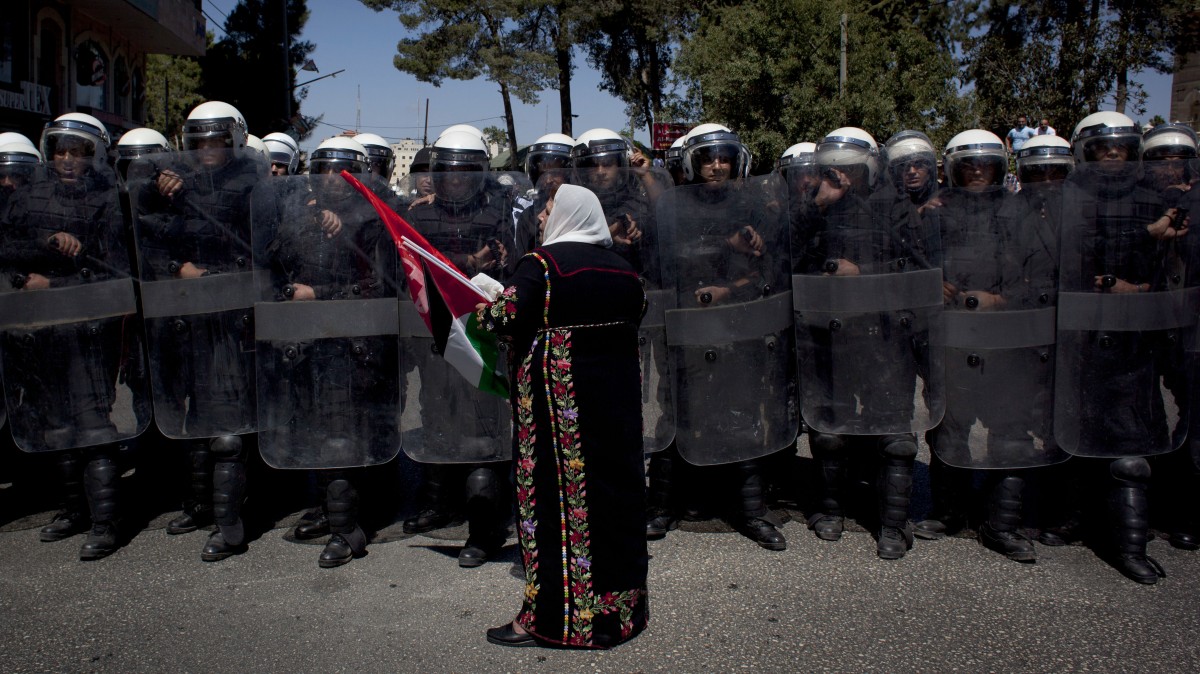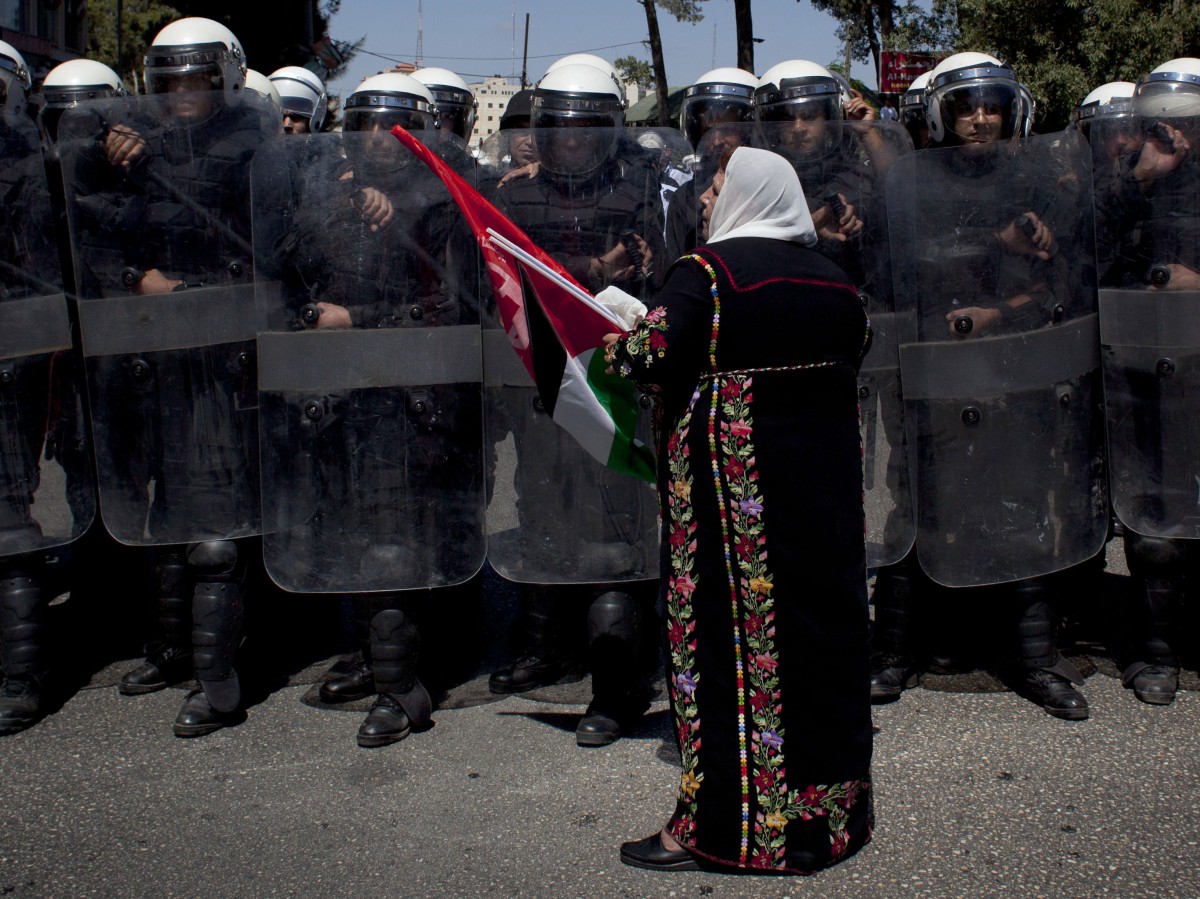
RAMALLAH — The Obama administration appears to have put the Israeli-Palestinian negotiations on the back burner once again.
Negotiations were renewed in July after months of U.S. Secretary of State John Kerry’s shuttle diplomacy. Yet their status is uneasy after the killing of two Israeli soldiers in the occupied West Bank.
In Hebron, a sniper shot and killed a soldier in front of the Al-Ibrahimi Mosque, resulting in Israeli Prime Minister Benjamin Netanyahu’s announcement to allow settlers to occupy another home in the city’s renowned holy site.
Additionally, five Palestinians have been killed by Israeli military forces since the start of the latest talks, one of whom was a U.N. employee.
It appears that neither the U.S. nor Israel expects any concrete results from the ongoing negotiations, which just months ago were praised by supporters for being the first in three years.
On top of that, Palestinian negotiators have repeatedly expressed pessimism. “Israel has not proposed anything so far, over a month and a half since peace talks have been resumed,” senior Fatah official Nabil Shaath told Ma’an News Agency earlier this month.
Among the issues that Israel has thus far refused to bend on are the exclusively Jewish character of the state of Israel and military control over the Jordan Valley region of the Israeli-occupied West Bank, considered vital to security.
“The Israeli side does not recognize any of the agreements signed previously including Oslo and the Road Map plan which the Palestinian side has fully implemented,” Shaath explained.
Yet despite its own misgivings towards the ongoing negotiations, the Palestinian government has simultaneously sought to crush dissent by executing a series of attacks and arrests across the West Bank.
“This is how the Palestinian Authority deals with the opposition,” said Shawan Jabarin, director of independent human rights monitor Al-Haq. “They don’t deal with politics in a very sophisticated way … because they know very well they cannot deliver any results to the Palestinian people.”
“A policy of violence”
37-year-old Ajmad Odeh was shot and killed by PA police forces on Wednesday, Aug. 27. Palestinian officials described the scene as “an exchange of fire between the security forces and a wanted man in Askar refugee camp,” Ma’an News Agency reported.
An independent investigation conducted by Al-Haq found that the “wanted man” was to be arrested “for allegedly distributing a statement criticizing the Palestinian Authority’s decision to resume negotiations with Israel.”
The report called on “the Palestinian Authority, the Palestinian Attorney General and security officers to abide by their obligation to conduct immediate, transparent and impartial investigations into this arrest operation.”
The likelihood of the PA opening an investigation into its own abuses is slim.
Less than a week later, on Sept. 2, PA police launched an arrest campaign in al-Fara refugee camp near Tubas, situated in the northwest region of the West Bank. According to Ma’an, two people were injured and five more arrested after “unknown gunmen opened fire at PA forces … as they raided the al-Fara refugee camp to make an arrest.”
When asked why the PA has amped up its attacks on Palestinian citizens, Al-Haq’s Jabarin explained that “there is no accountability in the government or the security forces.”
“There is a policy of violence,” he added. “That makes it easy for them to shoot on the people. If there were any political will to stop these violations, they would say clearly that anyone who shoots on people will be removed [from the security forces].”
When protesters assembled in Ramallah to denounce the negotiations in late July, PA forces beat and arrested several. “The police beat protesters and then arrested injured people, some even from the hospital,” said Tom Porteous, deputy program director at Human Rights Watch. “The Palestinian Authority needs to make clear to the police that this is no way to handle a demonstration.”
In January, three residents of Ramallah’s al-Am’ari refugee camp were hospitalized when PA police opened fire on a demonstration in solidarity with Palestinian political prisoners.
“The way they attacked the camp — surrounding all of the entries and coming from behind the … school, blocking the exit. It felt just like when the Israelis attack us, putting us in a collective torture chamber,” Ehab el-Shafie, a 21-year-old resident of al-Am’ari, said in an interview with Mint Press News.
Accusations of human rights violations are nothing new for the PA. Similar attacks on unarmed protesters occurred outside the presidential compound in Ramallah during the summer of 2012 as well.
A 2008 report issued by Al-Haq found “rampant torture” in PA prisons — the victims were generally Hamas affiliates or people originally from Gaza. The report detailed “an increase in psychological torture, an increase in arbitrary arrests, and arrests and detention carried out in violation of the Palestinian Basic Law and penal procedural laws.”
PA security forces and civilian police are trained by the U.S. and the European Union, as well as private security firms.
“Layers of occupation”
Arguing that the two-state solution is presently unfeasible, Jabarin explained:
“The PA has built its strategy on nothing. They continue to move in the same circular framework of the Oslo Accords, and they do not even approach the actual details. The best that Palestinian negotiators hope for is a situation in which they aren’t the ones blamed by the Americans for the collapse of negotiations.”
The historic negotiations between Israeli and the Palestine Liberation Organization (PLO) in the mid-1990s, the Oslo Accords, led to the Declaration of Principles, which included the mutual recognition of Israel and the PLO. As a result, the PA was established in 1994 and a negotiating process began.
Israel was meant to withdrawal throughout a five-year period from the Gaza Strip, Jericho and other unspecified parts of the Palestinian territories that it occupied during the June 1967 War. Only in 2005 were the settlers in the Gaza Strip evacuated. Eventually in November 2012, the United Nations General Assembly voiced a landslide approval by voting to recognize an independent Palestinian observer state in the West Bank, the Gaza Strip and East Jerusalem.
Yet as this month marks the 20th anniversary of Oslo, Israel’s presence in the West Bank and East Jerusalem is stronger than ever. According to the Israeli human rights organization B’Tselem, over 515,000 settlers live in over 125 settlements spread across the West Bank and East Jerusalem. In the period since the agreements, over 12,000 Palestinian homes have been demolished by Israeli forces.
Against this backdrop, belief in a viable two-state solution has plummeted. A July 2013 survey administered by the Hebrew University found that 51 percent of Israelis believe settlements have rendered such an outcome impossible, and 58 percent of Palestinians think it’s “no longer viable.” Negotiations are largely seen as a smokescreen for Israel’s efforts to expand settlements and further entrench its military presence.
“Ask the Palestinian people and they’ll tell you that negotiations will lead to nothing,” Jabarin explained. “It’s not that Palestinians are necessarily against negotiations, but they’re against these negotiations that never produce results. They have serious doubts and believe that the [Palestinian] Authority is incapable of negotiating and gaining anything.”
Fatah, the ruling party in the West Bank, is the only major party to officially support negotiations, with most officially denouncing them. “All major political factions, with the exception of Fatah, have rallied against a return to negotiations,” according to a recent Ma’an report.
On Wednesday September 7, the Popular Front for the Liberation of Palestine (PFLP) organized a 1000-strong march to the presidential compound. “We are against negotiations because they do not serve the interests of the Palestinian people,” Abdulrahim Malouh, the leader of the PFLP, told Palestinian media.
Though there were no clashes, PA police forces saturated the streets and watched closely.
In the besieged Gaza Strip, hundreds of Hamas and Islamic Jihad supporters recently protested negotiations. “All the Palestinian factions say you don’t have the right to relinquish any piece of our land, or to give up Palestinian rights,” Ismail Ridwan, Hamas’s religious affairs minister, publicly addressed PA president Mahmoud Abbas.
Abbas has come under fire several times for ostensibly renouncing the right of return for Palestinian refugees.
Some $500 million in aid from the U.S. government was released to the PA in March, and the Obama administration cleared another $148 million in late August. Jabarin concluded that as long as the money keeps pouring in, there will be no change in either the PA’s policy of negotiations or its use of violence to crush dissent.
“Because the political will doesn’t exist, anytime there are problems or people protest against them, they will attack and shoot, they will injure and kill,” Jabarin concluded.
El-Shafie concluded by describing the present situation living under the PA: “Here we have layers of colonialism and occupation — the Palestinian government is just another layer because it is an Israeli client.”
Patrick O. Strickland is an investigative reporter at Mint Press News. His writing has appeared at Al Jazeera English, The Electronic Intifada, AlterNet, and elsewhere. Follow him on Twitter: @P_Strickland_


